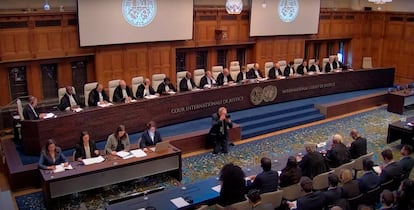UN court does not demand ceasefire in Gaza but tells Israel to take measures to prevent genocide
The judges order Israeli authorities to ensure the provision of humanitarian aid and report within a month on the steps taken


The United Nations International Court of Justice (ICJ) on Friday ordered Israel to adopt all necessary measures to prevent acts of genocide against the Palestinian population in Gaza, but it avoided adopting the most emphatic measure: demanding a ceasefire. The court did not tell Israel to stop its military offensive in the enclave, where the death toll is upwards of 26,000, but demanded that it take “immediate and effective” measures to ensure the provision of urgently needed humanitarian aid and basic services. This shows that the court, the highest judicial body of the United Nations, is aware of the human tragedy that is taking place in the area, as its president, Joan Donoghue, has indicated.
The ruling stems from the case brought in late December by South Africa to the ICJ, with the argument that Israel has “genocidal intention” against the Palestinian population (more than 1% of the population of the enclave has died since the start of the military incursion). To this end, South Africa invoked the 1948 Convention on the Prevention and Punishment of Genocide, to which both countries are parties. South Africa also stressed in its allegations that what happened in the Strip “exceeds legitimate defense.” It demanded immediate precautionary measures to prevent this alleged case of genocide. Friday’s decision involves only those emergency measures. The core of the case — whether or not genocide is being committed in Gaza—may take years to resolve.
Among the measures dictated by the ICJ is the demand that Israel ensure that its troops do not commit acts of a genocidal nature; that incitement to genocide be prevented and punished; and that the destruction of evidence of crimes be avoided. In addition, Israel must inform the ICJ of compliance with these measures within one month.
During the reading of the decision, Donoghue made it clear that the court is fully aware of the context in which events are unfolding. Not only because of what Israel is doing in Gaza, but also because of the reasons it gives for launching its offensive after the Hamas attack on October 7. She described the humanitarian situation in Gaza as “catastrophic,” and said that there is urgency due to the risk that the situation will worsen, but she also mentioned Hamas. In this context, the court urged for the immediate and unconditional release of the Israeli hostages who are in the hands of the Islamist militia and other groups.
The ICJ’s decision has been one of the most complicated and politically tense faced by this court. “It has carefully considered the allegations made against Israel by United Nations experts and officials to justify its measures,” says Asier Garrido Muñoz, a former ICJ lawyer, on the phone. In his opinion, although the court did not demand a halt of hostilities, “the judges have gone as far as the convention allowed them.” And the provision about allowing humanitarian aid into Gaza “indicates that the court understands the terrible humanitarian situation of the Palestinian population.” Does this ruling isolate Israel? “International pressure on Israel will from now on be very strong, so that even if it does not stop the military operation, it will at least carry it out in a very different way from now on.”
Although the precautionary measures are binding, it is possible that Prime Minister Benjamin Netanyahu’s government will not comply with them because the court does not have the capacity to enforce its decisions. Hence the use of the executive mechanism applied by judges asking Israel for reports on what it is doing. Article 41 of the ICJ Statute indicates that it must inform the U.N. Security Council about the decision it has adopted. The Council can remind Israel to comply with what the judges have ordered, or take its own measures. But it is not obliged to do the latter and, if it does so, it is bound by the Charter of the United Nations.
The panel was made up of 17 judges: the 15 ordinary ones plus two other ad hoc judges, appointed by the parties in dispute, who did not have anyone representing their nationality. On the Israeli side, there was Aharon Barak, former president of the Supreme Court of his country. He voted for humanitarian aid to be allowed into Gaza, and for Israel to prevent and penalize incitement to genocide. Dikgang Moseneke, who was vice president of the Supreme Court, intervened on the South African side.
If South Africa moves forward with this case from now on, the merits of the case will be evaluated and Israel may file preliminary objections to the court’s jurisdiction. Overall, a ruling on whether there has been genocide in Gaza could take several years to be handed down.
Sign up for our weekly newsletter to get more English-language news coverage from EL PAÍS USA Edition
Tu suscripción se está usando en otro dispositivo
¿Quieres añadir otro usuario a tu suscripción?
Si continúas leyendo en este dispositivo, no se podrá leer en el otro.
FlechaTu suscripción se está usando en otro dispositivo y solo puedes acceder a EL PAÍS desde un dispositivo a la vez.
Si quieres compartir tu cuenta, cambia tu suscripción a la modalidad Premium, así podrás añadir otro usuario. Cada uno accederá con su propia cuenta de email, lo que os permitirá personalizar vuestra experiencia en EL PAÍS.
¿Tienes una suscripción de empresa? Accede aquí para contratar más cuentas.
En el caso de no saber quién está usando tu cuenta, te recomendamos cambiar tu contraseña aquí.
Si decides continuar compartiendo tu cuenta, este mensaje se mostrará en tu dispositivo y en el de la otra persona que está usando tu cuenta de forma indefinida, afectando a tu experiencia de lectura. Puedes consultar aquí los términos y condiciones de la suscripción digital.








































